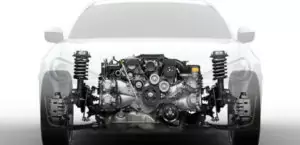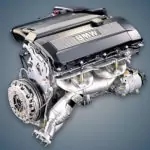The BMW M43B19 engine, better known as the M43TU, is the largest of the lineup and has a displacement of 1.9 liters (1895 cc). A distinctive feature of these power units is the use of the proprietary fuel injection system BMW BMS 46. There are two modifications with different power levels.
- M43TUB19 UL: weak version with a different camshaft, power 105 hp at 5300 rpm, torque 165 Nm at 2500 rpm;
- M43TUB19 OL: basic version of the engine with a power of 118 hp at 5500 rpm, a torque of 180 Nm at 3900 rpm.
Specifications
| Production years | 1998-2002 Steyr Plant |
| Displacement, cc | 1895 |
| Fuel system | injector |
| Power output, hp | 105 /5300 rpm 118 /5500 rpm |
| Torque output, Nm | 165 /2500 rpm 180 /3900 rpm |
| Cylinder block | cast iron R4 |
| Block head | aluminum 8v |
| Cylinder bore, mm | 85 |
| Piston stroke, mm | 83.5 |
| Compression ratio | 9.7 |
| Features | DISA |
| Hydraulic lifters | yes |
| Timing drive | chain |
| Phase regulator | no |
| Turbocharging | no |
| Recommended engine oil | 5W-30 |
| Engine oil capacity, liter | 4.0 |
| Fuel type | petrol |
| Euro standards | EURO 2/3 |
| Fuel consumption, L/100 km (for 318i E46) — city — highway — combined |
11.0 6.0 8.0 |
| Engine lifespan, km | ~350 000 |
| Weight, kg | 138 |
Disadvantages of the M43B19 engine
The main problems of the BMW M43B19 engine are oil leaks, engine knocking and crackling, unstable rpm, dips when accelerating.
 If there is noticeable noise, knocking and crackling in the engine, it is worth checking the integrity of the DISA damper and, if necessary, use a repair kit to put the intake system in order. Sometimes rocker arms or hydraulic lifters cause knocking.
If there is noticeable noise, knocking and crackling in the engine, it is worth checking the integrity of the DISA damper and, if necessary, use a repair kit to put the intake system in order. Sometimes rocker arms or hydraulic lifters cause knocking.
Oil leaks are caused by the valve cover. To eliminate the breakdown, it is necessary to install a new gasket and crankcase ventilation valve.
Dips when picking up speed are usually caused by dirty injectors that need to be cleaned.
Instability of revolutions provoke breakdowns of the air duct on the mass air flow sensor; air leaks are not excluded. If everything is in order with these elements, check the lambda probe, throttle valve, mass air flow sensor and idle valve. Difficulty turning the camshaft can also cause floating rpm.
If you experience overheating, you should inspect the pump, radiator, thermostat and cooling system for air pockets. When the engine does not start, check the spark plugs, the gas pump, the ignition coil and high-voltage wires.






